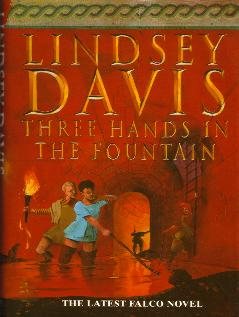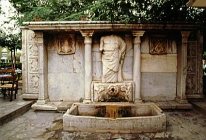 August-October,AD73, Falco is back in Rome after his expedition to Baetica, and is having a drink with Petro, his long time friend from his days in the Second Augusta. Petro is suffering durance vile, away from his wife, Arria Silvia. Petro is going into partnership with Falco; Ma (Junilla Tacita) has other ideas and wants her convalescent Anacrites to team up with her son!
August-October,AD73, Falco is back in Rome after his expedition to Baetica, and is having a drink with Petro, his long time friend from his days in the Second Augusta. Petro is suffering durance vile, away from his wife, Arria Silvia. Petro is going into partnership with Falco; Ma (Junilla Tacita) has other ideas and wants her convalescent Anacrites to team up with her son!
Gruesome discoveries of body parts in various segments of the drinking water supply draws Falco into his next task – or mission we might say, as the Emperor Vespasian suggests to Julius Frontinus that he obtain assistance through Camillus Verus, which leads the ex-Consul directly to Falco’s home.
Meanwhile, Petro has placed a reward poster up in the Forum for all and any body parts retrieved from the water supply, an initiative (apart from creating public pandemonium and riots, occasionally) that brings all sorts of low types with grotty objects fished from fountains, aqueducts and sewers seeking the reward. Even Falco’s nephew, the street-wise Gaius gets in on the act with a human toe!
Meanwhile, Claudia Rufina, a heiress with considerable fortune, has come to Roma and is staying at the Camilli household, where matrimonial possibilities are taken up very quickly for Claudia and the elder Camilli son, Aelianus. In the background, the tall, shy Justinus hovers, allegedly hankering after an actress; he is idle with his senate career brought up short by a forgetful Vespasian. (Not to put too fine a point, perhaps Vespasian is protecting the Camilli, for it was Sen. Camillus Verus’s brother who fomented and led an attempted coup against the Palatine Hill, which was quickly nipped in the bud and dealt with quietly behind the scenes. Camillus Verus was a selfless servant of Rome, but walked under the cloud of his brother’s treachery. Exeunt Justinus from the senatorial elections).
Aqua, Aqua!
As body parts begin to emerge in various waterways, Rome’s water supply takes the centre stage as Falco and Petro call in on the Curator of Aqueducts to obtain information, only to discover that Falco’s nemesis Anacrites self-recruited to the Office of Aqueducts in order to lead the investigation. Dice the Curator’s office, for Frontinus, the governor-Elect of Britain, obtains faster results and encounters the archetypal self-important public servant, Statius, a water engineer. A young subordinate, Bolanus, is earmarked by Falco for more effective assistance.
The supply of water via aqueducts takes the narrative focus as Falco and Frontinus learn about sand filters, rivers, dams, construction and entry points to the covered waterways. Bolanus (somewhat enamoured of the engineering feats of construction) proves to be an able tutor and guide. The scene moves from Roma and varia streets around temples to countryside rivers with adjoining properties and the entry points to the water supply.
The Games and the Night Moths
The Roman Calendar is populated with well over one hundred public holidays annually; there are over fifty festivals, various black days (bad luck days) and various Games peppered throughout the year, all of which take place in the Circus Maximus. There are the Megalensis Games for Cybele, the Games for Ceres, and then the Floral Games. In July, there are the Apolline Games and the Games for the Victories of Caesar which last for a whole ten days. In September come the great Roman Games lasting fifteen days, then the games in memory of Augustus, followed at the end of October by the Games for the Victories of Sulla, and the Plebeian Games in November. It begins to sound like a modern football season with rounds!
Falco has determined from his brother-in-law Lollius that the body parts are often discovered during the early days various Games.
The seedy side of Rome and the ladies of the night are never far from the centre stage in this narrative, for all the body parts (hands, head, torso) are female in origin. Falco’s Rome has 32,000 registered prostitutes. There are the ladies of night, bare arms, bare neck, bare shoulders with gapes in their gowns; the silly girls who walk together daring would be men to take them up. We encounter the former beau of the late Festus (Falco’s brother who passed in Judea, being first over a pile of dirt), Marina (to whom Falco provides maintenance for his deceased brother’s daughter). When the madding crowd emerge from the Circus Maximus, the ladies come last; there are also the ladies loitering in lanes, waiting for men to emerge. These are the Night Moths, as Petro calls them.
Say it again, Partner
Petro and Falco, good friends, tent mates from the Second Augusta in Britain, and both working within the ambit of the peace of Rome. But partners? Falco has self discipline and self control as an informer. He avoids the normal hang out of the informers of Rome, the Saepta Julia, and does not engage in telling tales against others out of school. Being an informer in the discipline followed by Falco involves keeping fit at Glaucus’s club, extracting information when others are not aware they are imparting same, and working without the rule of law, or authority.
Petro, on the other hand, an Enquiry Captain in the Vigiles, is used to wielding a cudgel and speaking authoritatively, and getting answers (quite possibly by promising appointments with Sergius, the cohort’s thrasher). The subtle ways of informers are lost on Petro as his character and temperament are fundamentally unsuited. However, Anacrites manages to surprise Falco when they emerge from the sewer with Anacrites behaving characteristically like a spy, for once.
Frontinus, the ex-Consul of Rome joins forces with Falco, and brings his skill and background as general, lawyer, city administrator, statesman into play and gets results quickly, albeit guided by the Lady with Nous, Helena Justina. Petro learns that Falco’s true partner is one he never has to tell secrets to.
Available on Amazon
Imago Roma

Ancient Roman Fountain, headless…
![]()

